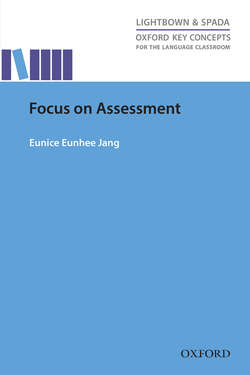Focus on Assessment

Реклама. ООО «ЛитРес», ИНН: 7719571260.
Оглавление
Eunice Eunhee Jang. Focus on Assessment
Acknowledgments
Series Editors’ Preface
Introduction
1 Uses of Language Assessment
Preview
Language Learners in Today’s Classrooms
Multiple Roles Teachers Play in Language Assessment
Purposes of Language Assessment
Preparing the Way for Our Journey to Language Assessment
Using Assessment in Classrooms
Standards-Based Language Assessment
NLLIA ESL Bandscales from Australia
Steps to English Proficiency in Canada
Council of Europe: CEFR
Language Testing in the Context of NCLB
High-Stakes Testing in EFL Contexts
Summary
2 What Teachers Need to Know about Theories of Language Development
Preview
Language Proficiency Development
Is Language Proficiency Unitary or Multi-componential?
What is Academic Language Proficiency?
Vocabulary Knowledge
Grammar Knowledge
Discourse Knowledge
Language Functions and Skills
Assessing ALP in Classrooms
Key Features of ALP Development in Young and Adolescent Learners
How Long Does it Take to Acquire ALP?
Differentiating Language Development from Exceptionalities
Summary
3 Principles for Assessing Young Language Learners
Preview
Mapping out Assessments
Assessment Should be Cognitively Rich Enough to Elicit Knowledge and Skills
Assessment Tasks Should Measure Essential Core Skills
Assessment Should Promote Positive Learning and Assessment Experiences
Assessment Should Provide Consistent and Reliable Information on Proficiency
Assessment Should Promote Students’ Ability to Self-Assess
Assessment Should Provide the Support Needed
Summary
4 Principles for Assessing Adolescent Language Learners
Preview
Portfolio Assessment Should Promote Learner Autonomy
Assessment of Oral Proficiency Should Consider Dynamic Peer Interactions
Assessment Should Consider the Influence of Parents’ Beliefs about Assessment
Teachers’ Assessment Competence is Key to High-Quality Assessment Practice
Assessment Should be Culturally Responsive and Fair
Assessment Should Take Advantage of the Benefits of Technology
Summary
5 Language Assessment: What We Know Now
Preview
Reflecting on Ideas about Assessment: Learning from Research
Conclusion
Suggestions for Further Reading
Appendix
Glossary
References
Отрывок из книги
I am grateful to many people without whom this book would not have been possible. Heartfelt thanks to my daughter Jayun, my biggest fan and harshest critic, who had to share two years of her mother’s attention with this book. I would also like to thank Maryam Wagner, who was there for every step of the journey. I want to thank my series editors, Nina Spada and Patsy Lightbown for inviting me to contribute to this OUP series for teacher development. I appreciate their timely feedback and encouragement throughout the book project. Finally, I thank the many teachers and students who shared their experiences, beliefs, and visions about assessments by participating in various research activities presented in this book.
The idea for the series was inspired by the book How Languages are Learned. Many colleagues have told us that they appreciate the way that book can be used either as part of a university teacher education program or in a professional development course for experienced teachers. They have commented on the value of publications that show teachers and future teachers how knowing about research on language learning and teaching can help them think about their own teaching principles and practices.
.....
In Chapter 3, we will take into account some of the principles for assessing young language learners and discuss various assessment approaches and issues associated with them according to the purpose and degree of standardization of assessment.
In Chapter 4, we will continue to discuss assessment principles for adolescent language learners based on an ecological assessment systems framework.
.....